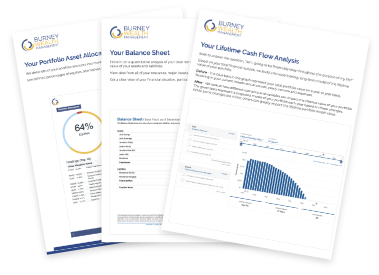3 ways we helped our clients navigate 2020
.jpg)
While year-end chatter typically revolves around market prognosticators and analysts making predictions about what will happen next year (how did that work out in 2020?) we would like to take time to reflect on how we helped clients navigate a historical year for the markets and economy.
1. Direct Communication
In today’s fast-paced world of technology it is easy and convenient for anyone to monitor the daily market swings. This can make it difficult to know what information is and is not relevant to your situation. The financial media does not know your risk tolerance or the details of your personal financial life. So how do you know what information YOU should be focused on in the context of your plan? This one of the key benefits of having a trusted financial advisor.
Our advisors took a proactive approach during the market selloff where in a four-week period from late February through late March the stock market experienced the fastest market correction ever of 30% or worse from all-time highs. Our advisors called and sent email updates to clients on what was happening and how it was relevant in historical context as well as to their situation.
We listened to what our clients were feeling, thinking, and worrying about and provided necessary reassurance that while the current market conditions are scary, those that stay disciplined were quickly rewarded.
We listened to what our clients were feeling, thinking, and worrying about and provided necessary reassurance
2. Educational Content
In addition to our advisors directly communicating with their clients, we also provided both written and live audio content in the form of blog posts and webinars.
Our leadership team held three webinars in March alone as volatility was accelerating and concerns were rising. These webinars are available on our YouTube channel and were focused on easing client concerns and addressing the investment changes we were making or not making. We also held a webinar in the fall to address concerns about the Presidential election and its impact on the markets.
We supported our webinars with blog posts, two of the most popular being 'Three Lessons Learned from the 2020 Market Crash' and 'Taking Control in Volatile Markets' to help clients further put the year into context and alleviate the urge to make fear-based decisions.
Armed with content and an open line of communication with their advisor, the next question many of our clients had was “what should we be doing differently going forward?”
3. Strategy Changes
Armed with content and an open line of communication with their advisor, the next question many of our clients had was “what should we be doing differently going forward?” We helped our clients use market uncertainty to their advantage by focusing on the following:
- Making opportunistic changes to our equity strategy: While maintaining discipline and staying invested is a key driver of long-term success, so is taking advantage of market opportunities when they present themselves. Our investment team proactively adjusted our client stock allocations to capitalize on misalignments in the market as a result of the sell off. Our Director of Investment Strategy outlined these changes in detail during one of our March webinars and in a blog post.
- Tax Loss Harvesting: A benefit of working with an advisor that invests a percentage of your portfolio in a diversified basket of individual stocks is it allows them to sell certain positions at a loss to help offset your realized capital gains tax bill. When the market collectively falls like it did during the first quarter of the year, we are able to sell certain positions at a loss and reinvest the cash into other opportunities. The end result is a lower tax bill for our clients where this strategy was appropriate.
- Financial Planning Opportunities: We helped many clients capitalize on several attractive financial planning opportunities this year. These include converting pre-tax funds to Roth (especially for those clients that did not need to take their Required Minimum Distribution), capitalizing on the higher charitable deduction allowed, adjusting to lower health insurance premiums, and revisiting each client's overall financial plan with them to determine if changes were needed as a result of what was transpiring.
The Burney Company is an SEC-registered investment adviser. Burney Wealth Management is a division of the Burney Company. Registration with the SEC or any state securities authority does not imply that Burney Company or any of its principals or employees possesses a particular level of skill or training in the investment advisory business or any other business. Burney Company does not provide legal, tax, or accounting advice, but offers it through third parties. Before making any financial decisions, clients should consult their legal and/or tax advisors.





